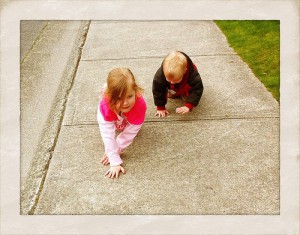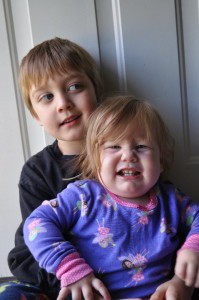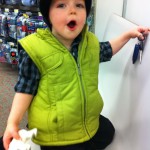Here’s something that happens a lot: I say something. My child (I’m thinking particularly of my 4-year-old) argues the opposite. He’s not at all correct. In fact, he’s so not correct, his statement doesn’t make any logical sense at all.
- Mom, this is how you spell “people”: p-e-p-l. Oh, close…there are a few more letters in there. No, that’s how you spelling exercise.
- JJ, it’s time to be done with computer games. You never let me play computer!
- Mom, what did we have for breakfast today? We had eggs. No, we didn’t! We had muffins. Actually, we had eggs today. We had muffins yesterday. No!
Where do I go from there? There are so many potential back-and-forths to be had with these kinds of statements. Do I bother? What are my choices for how to respond to ridiculous arguments? As I see it, I could:
Retort Back. I could issue the classic, “Don’t argue with me” statement. Many parents don’t like the feeling of being talked back to or argued with. It undermines their authority, and negates the message that they are “right.”
I think arguing is actually a valuable skill to have. I want my kids to be able to disagree and feel confident enough to share their thoughts. This will lead to standing up for themselves during tough moments or speaking up for others when it matters.
I also don’t want to send the message to my kids that they must be seen and not heard, or that different thoughts equal wrong thoughts. Sure, sometimes they might be wrong (the correct spelling of the word “people” is pretty indisputable), but there’s a difference in shutting down a child’s voice with an “I’m right, you’re wrong” attitude, and listening to their different–and, yes, maybe even wrong–thoughts with acceptance. It sets the stage for learning healthy debate skills and an open approach to communication. Though there are many times I’d like to respond to my kids with “Don’t argue with me,” I know that arguing is essentially good for them. It is helpful for kids to be able to disagree with authority figures in a safe environment and hone their Stick-Up-For-Myself skills.
Argue With Him. This is probably the most instinctual. When opposed, I can always come up with lots of excellent examples that really make my case. It’s only too easy to argue with my child over how much time he actually does get to spend on the computer, or how many muffins we don’t have in the pantry because we ate them…yesterday. But why do I feel the need to prove my point to a 4-year-old? And what will it truly result in?
- No, it was eggs today. Remember I asked you if you wanted scrambled eggs? No. And you said yes, and I asked you if you wanted them with cheese or no cheese? No. And you said with cheese, so we had cheesy eggs today. No! I didn’t say that!
- Of course I let you play computer! What have you been doing this morning? You played it yesterday too, and every day. You get plenty of computer time. No I don’t! I don’t get to play it hardly ever!
Perpetuating the argument only results in my son continuing to assert that he is right, now more loudly and with more emotion, because his autonomy is being threatened. Arguing with a child becomes less about the issue at hand and more about asserting control. One of us has to be a grown-up and disengage in this kind of pointless power struggle. Oh, right, that would be me…the grown-up.
Let it Go. Say, “OK.” Moving on. Because really, what does it matter? If my son mistakenly thinks we had muffins instead of eggs for breakfast, who does that hurt? How important is it for me to push the issue, and what will it cost our connection to do so? I’d rather agree to disagree about breakfast than put distance in our relationship.
Hear Him Out. Give him a chance to explain his seemingly ridiculous argument. “Oh?” “Is that what you think?” “What makes you say that?” “Tell me more.” “Ah, I see…” Asking these types of curiosity questions shows my child that I’m interested in what he has to say, even if I disagree. They also shift the conversation from confrontational to communicative. It tells him, “We see things differently, but I am interested in hearing you. I will listen, and you can help me understand.”
Listen to What He’s Really Trying to Say. Why do kids adamantly say things like “you always…” and “you never…”? Well, it’s based on the way the child feels at the time the statement is made. “You never…” and “You always…” indicate that he has strong feelings about that situation. “You never let me play computer” translates to, “I love playing computer and I’M SO ANGRY that I can’t play right now!” But of course, a 4-year-old’s brain isn’t capable of articulating that. Rather than try to prove my point with arguments and examples, I can simply acknowledge my child’s side of the argument and the feelings that are bringing it to light.
An argument with a child is rarely about the topic at hand. The verbal intensity and seeming lack of logic are brought on by the feelings underlying a child’s belligerence. So, for me and my argumentative 4-year-old, I could choose to ignore those feelings and assert my authority (focus on proving that I am right), or I could decide how important it really is that I “win” and respond to him with sensitivity. I can listen with acceptance and remind myself of his current stage of emotional, cognitive, and linguistic development. I can understand that the situation is not that he’s not listening to me; it’s that he’s not able to process information as I am. As any adult is. Because he’s four. But he won’t be four forever, and regardless of how obscure his perspective may seem right now, I can certainly make an effort to listen…for the future of our relationship and communication.







